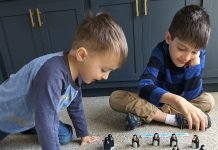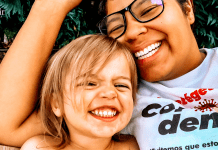We are working with our friends at New Strong, therapists (and moms) that work to create  a safe and creative space that fosters a spirit of resiliency. We sent them questions from our community as we cope with the changing news, disappointment and fears. Please comment below with your questions and we’ll work to get them answered!
a safe and creative space that fosters a spirit of resiliency. We sent them questions from our community as we cope with the changing news, disappointment and fears. Please comment below with your questions and we’ll work to get them answered!
How do we balance being informed with social media and news fatigue?
Give your family permission to consume a selective a
mount of news and social media. It is important to decide what might be best for the specific needs of your family. If you have a child or family member dealing with anxiety it is important that we are able to protect the messages they receive. We recommend taking breaks from consuming the news/social media and to take time to unwind, connect with others, and talk with people you trust.
What do we tell kids with anxiety, based on their age?
Take your child’s lead. Find out what your child already knows and answer their questions by providing age appropriate information. If you don’t know the answer say so, and try to find the answer. Humans are storytellers and we need to fill in the gap or the “. . .” to prevent their minds from going to the worst case scenario. Focus on what you’re doing to stay safe. An important way to reassure kids is to emphasize the safety precautions that you are taking. Stick to routine and keep communication open. As difficult as it may be we need to think back to how we handle hard things. Staying calm and creating emotional safety is the best way to decrease household anxiety.
Creating mantras are great exercises:
-
There are things I can do to keep myself healthy
-
We wash our hands to keep ourselves safe
-
Everyone gets sick sometimes
-
I can control … (washing my hands, cleaning my toys, what things I put in my body)
-
Hand washing song- Healthy hands
How we can help protect the mental health of grandparents or elderly relatives that may be seriously locked down right now?
Showing empathy for our older family members anxiety is so important! This is an opportunity for us to think creatively about the “who” and “how” of connection. Giving ourselves the permission to send handmade cards, care packages, and structured communication can be the best way to balance mental health for all. This is also a great opportunity to have our kids participate in the process. It is important to continue to get updated information on the current health status of our loved ones with kind but clear expectations of what is best interaction for our family.
Suggestions for keeping kids active and healthy when a lot of sports and outdoor activities are cancelled?
It is important that we keep our minds and bodies active during this time. Nature is still one of our safest ways of getting our family moving. We love the idea of creating a family activity jar. Have each person in your family write down 5-10 things they would love to do as a family (have a dance party, play hide and seek, make a scavenger hunt, download workout videos etc) each day pick two or three activities out of the jar and get ready to have some fun!
Our go to resources for our kids and activities that focus on the visual system to replace screen time:
Babies
Get on the floor with your baby! Making eye contact and interacting with your child on their level has so many developmental benefits. Sing songs, use high contrast toys, and highly textured toys to support your interaction. You can also use household objects for play. Have them kick a baking tin pan while lying on their back, reach for yarn with their arms while lying on their side, and look at a mirror while lying on their belly.
Toddlers
Hide preferred toys in tactile mediums! Hide puzzle pieces in dried beans, sand, or wet noodles. Toddlers put everything in their mouth. Try hiding preferred toys such as dinosaurs in jello. Check out @playfulpeaks for a video of this activity!
Grade school
Scavenger hunts! These can be outside or inside. Make a list of pictures or words for your child to find and mark off the list. While going on a walk, have them locate easy or hard parts of nature (i.e. something round, bug, piece of litter, two different trees, etc.) While inside, have them locate the letters of the alphabet written on post it notes around the house. Once collected, have your child place in sequence on the wall, write each letter on the window with a dry erase marker, or throw a ball at each letter on the wall to spell their name or other words. To make it harder, have them locate items that start with each letter of the alphabet (i.e. A-apple, B-book, C-candle, etc.).
Middle School/High School
This is an opportunity to put the screens down and share your hobbies. Teach your kids how to cook their favorite dish, learn about their favorite book series, do a workout together or even try a new craft on Pinterest, etc.
Additional Resources
GoNoodle, Cosmic Kids, Playful Peaks, Busy Toddler, Scholastic’s Learn at Home website, MamaOT.com, Sesame Street in Communities (great resource for addressing various social emotional topics at home).
What’s the best way to handle anxiety in children when/if their parents get COVID-19?
The best thing you can do for your family is to normalize being sick. When our kids see us taking care of ourselves, whether we’re healthy or sick, it takes the big scary mystery out of it! It is important to measure our actions on the current health status of our family. If we are experiencing a cold normalize how we treat a cold. If we are having more symptoms then we have more intervention. Reminding our kids that doctors will continue to find ways to keep our bodies safe and it is our job to follow their recommendations ie hand washing, using sanitizer, coughing into our elbows etc.
What are suggestions for coping with caregiver fatigue?
Being a caregiver can be overwhelming at times, especially during times of high stress. To protect yourself and be able to continue caring for your loves ones, it’s essential to learn good self-care techniques.
Above all, be aware of your own anxieties, level of stress and know when to ask for help. It is important that you are intentional with your time and care for yourself. Start by engaging in daily physical activity, eating a balanced diet, taking time for yourself when available, and establish a good sleep routine. Spend time on your hobbies, those things that make you feel joy, (i,e, read, journal, color, cycle, or hike).
When feeling stressed, take time to meditate, go for a walk. run a hot bath, call and chat with a friend or family member, speak with a therapist and ask for help.
Consultations and family plans
Do you have a grandparent who lives with you, have a specific health concern or maybe your kiddo has severe OCD and this news is making it sky rocket? New Strong therapists are available for phone consultations and are putting together individualized family plans tailored to your family’s needs.
















